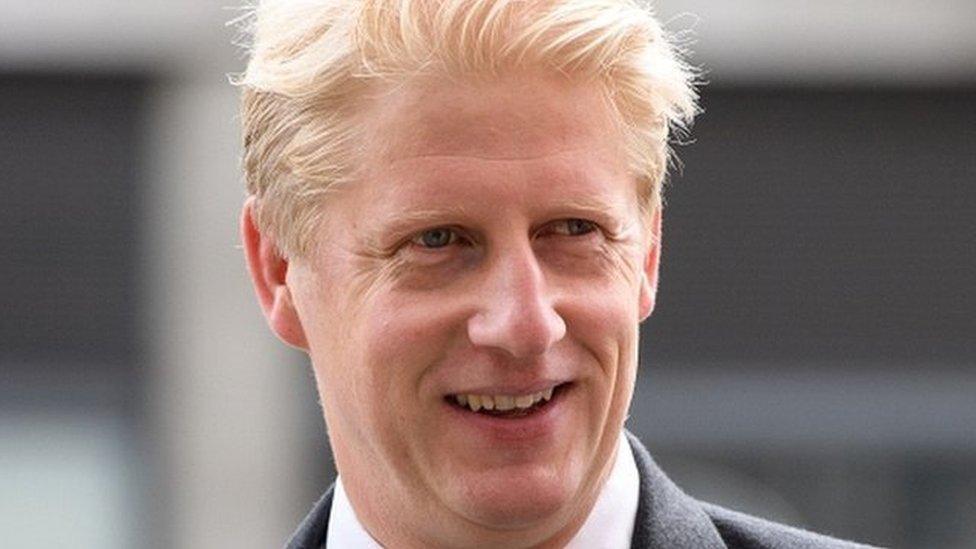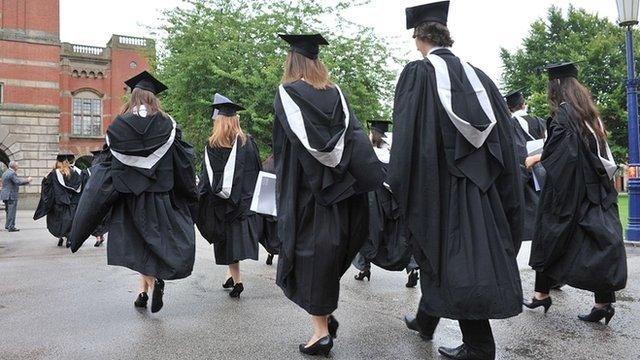Two-year degrees to lower tuition fees
- Published
- comments

More students will be encouraged to take degrees in two years
Students in England are going to be offered degrees in two years with a £5,500 saving in tuition fees, says the universities minister Jo Johnson.
Undergraduate courses will be condensed into "accelerated" degrees, with fees 20% less than a three-year course.
Mr Johnson said he wants to "break the mould" of a system in which three-year degrees have "crowded out" any more flexible ways of studying.
The Office for Fair Access says the plan could help to widen opportunities.
But Labour's shadow education secretary Angela Rayner said there was no evidence that "squeezing three years of learning into two will stop the huge drop in part-time students or lead to better outcomes".
Instead she said that in effect it would mean that for each of the two years of study, tuition fees would be more expensive than the current £9,250, at about £11,000 per year.
More flexible degrees
The idea of a two-year degree had been proposed earlier this year - but this latest version has moved further towards making it cheaper for students.
Students would take the same number of units and have the same amount of teaching and supervision, but degree courses would be delivered in one less year.
As well as reduced tuition fees, students will save on a year's living costs and will be able to start working a year earlier - a package which Mr Johnson says could cut costs by £25,000.
It would also be cheaper for the government, which would have lower tuition fee loans to fund, with this fee arrangement intended to be available from autumn 2019.
It is part of Mr Johnson's push for more value for money for students - after concerns that students did not think they were getting good value from their tuition fees.
It comes ahead of a wider review of fees and university funding expected in the next few weeks.

Jo Johnson says universities have to address value for money for students
The minister says the level of tuition fees for two year courses strikes the "right balance" between the fixed costs for universities, where the teaching hours will be the same as a three-year course, and a reduction for students for less time on campus.
There have been previous attempts to promote two-year degrees, but Mr Johnson said the numbers currently taking them were "pitiful", with only 0.2% of students on such accelerated courses.
"I think this reflects that the incentives in the system are completely skewed against it."
The minister said he wanted to promote a more diverse and flexible set of choices at university level - in a market currently dominated by the traditional three-year, residential degree.
Attracting mature students
Numbers of mature students have been declining in recent years - and Mr Johnson says that the two-year degree model could be a much more practical option for them.
"This policy will be particularly attractive for mature students who are looking to change their skills and adapt to changes in the economy - and who might want to go through higher education at a faster pace," he said.
Mr Johnson said that if universities saw students being attracted by such courses, there could be a "snowball" effect which would result in such courses becoming widespread.
The universities minister says he wants to move beyond being "stuck with a system that has increasingly focused on offering only one way of benefiting from higher education".
Mr Johnson said he "massively supported" new providers such as Sir James Dyson's engineering institute, which he said provided the kind of innovation that had been "sorely missing in the system".
This is a high-quality, work-focused project, where students learn alongside leading engineers - and where students do not pay tuition fees.
Nick Hillman, director of the Higher Education Policy Institute, said that "making two-year degrees more makes sense", particularly as a way to support mature students.
But he warned that this would mean a higher charge per year in fees than the current three-year degree.
And Mr Hillman warned that "it remains an open question whether there is sufficient support in Parliament for a higher tuition fee cap for a minority of courses".
Prof Les Ebdon, head of the Offa access watchdog, backed the calls for such fast-track courses.
"Accelerated degrees are an attractive option for mature students who have missed out on the chance to go to university as a young person," said Prof Ebdon.
"Having often battled disadvantage, these students can thrive in higher education and I hope that now many more will be able to take up the life-changing opportunity to get a degree."
The proposal was supported by Sir Anthony Seldon, vice chancellor of the University of Buckingham, an institution which already offers two year degrees.
"Two years are the ideal solution for those students who want to get on with their degree and forsake three-month summer holidays," said Sir Anthony.
- Published24 February 2017
